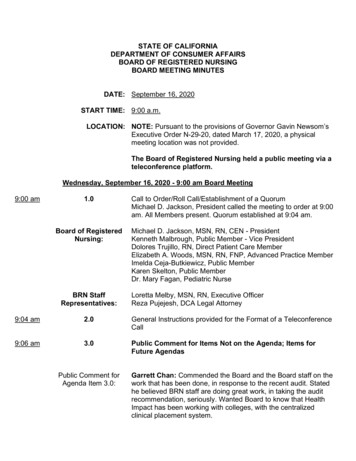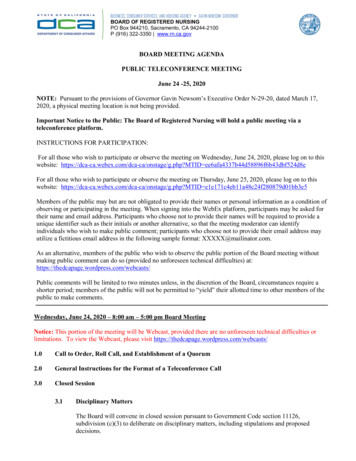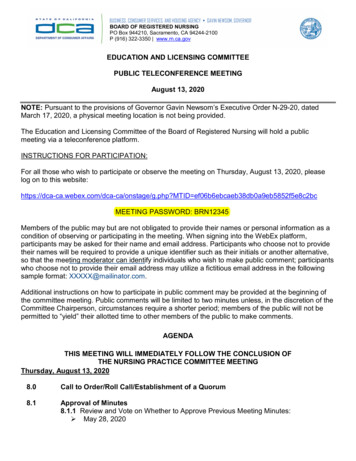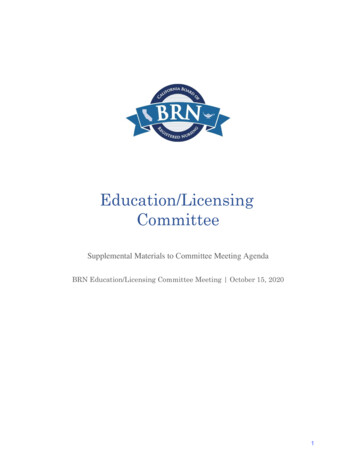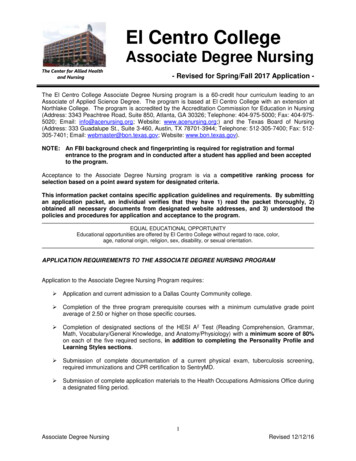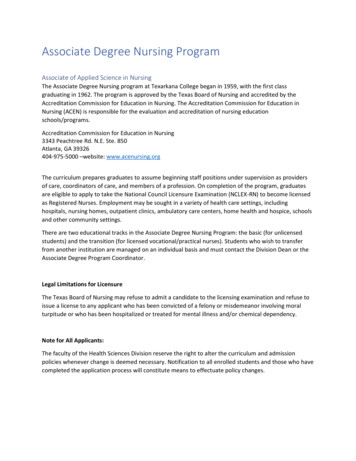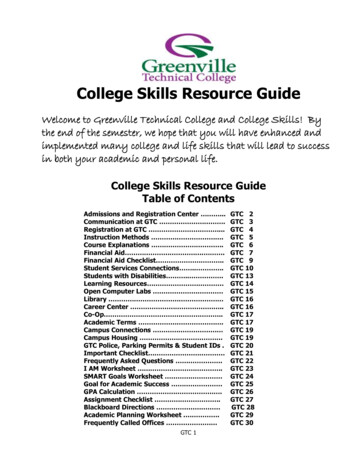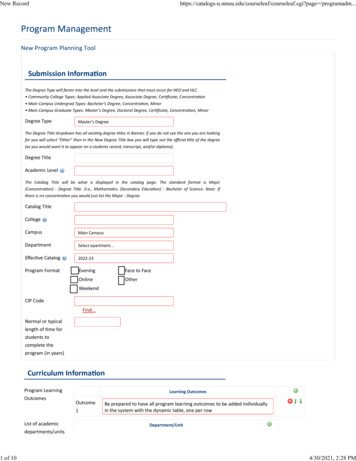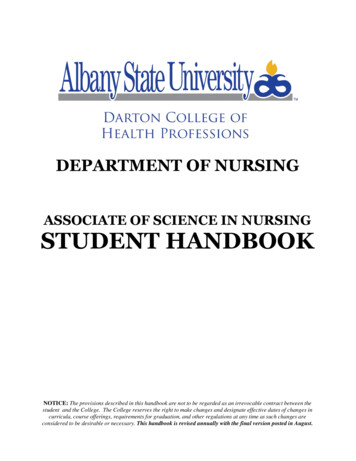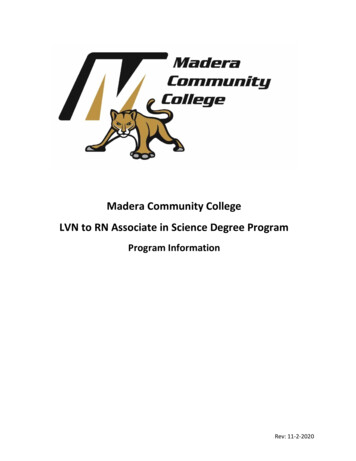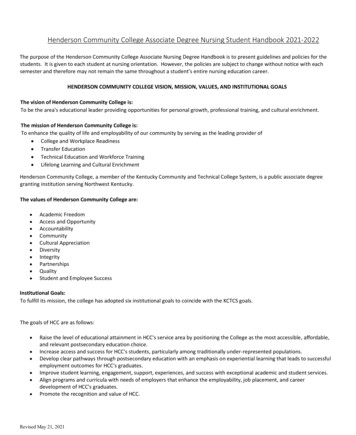
Transcription
Henderson Community College Associate Degree Nursing Student Handbook 2021-2022The purpose of the Henderson Community College Associate Nursing Degree Handbook is to present guidelines and policies for thestudents. It is given to each student at nursing orientation. However, the policies are subject to change without notice with eachsemester and therefore may not remain the same throughout a student’s entire nursing education career.HENDERSON COMMUNITY COLLEGE VISION, MISSION, VALUES, AND INSTITUTIONAL GOALSThe vision of Henderson Community College is:To be the area's educational leader providing opportunities for personal growth, professional training, and cultural enrichment.The mission of Henderson Community College is:To enhance the quality of life and employability of our community by serving as the leading provider of College and Workplace Readiness Transfer Education Technical Education and Workforce Training Lifelong Learning and Cultural EnrichmentHenderson Community College, a member of the Kentucky Community and Technical College System, is a public associate degreegranting institution serving Northwest Kentucky.The values of Henderson Community College are: Academic FreedomAccess and OpportunityAccountabilityCommunityCultural tudent and Employee SuccessInstitutional Goals:To fulfill its mission, the college has adopted six institutional goals to coincide with the KCTCS goals.The goals of HCC are as follows: Raise the level of educational attainment in HCC's service area by positioning the College as the most accessible, affordable,and relevant postsecondary education choice.Increase access and success for HCC's students, particularly among traditionally under-represented populations.Develop clear pathways through postsecondary education with an emphasis on experiential learning that leads to successfulemployment outcomes for HCC's graduates.Improve student learning, engagement, support, experiences, and success with exceptional academic and student services.Align programs and curricula with needs of employers that enhance the employability, job placement, and careerdevelopment of HCC's graduates.Promote the recognition and value of HCC.Revised May 21, 2021
Dear Nursing Student,Welcome to Henderson Community College Associate Degree Nursing Program. If you are a new student in Nursing, you arebeginning an exciting, challenging and rewarding experience. If you are a returning student, you are aware of the demanding butsatisfying course you have chosen. The faculty and staff wish you the best in fulfilling your goal.This handbook along with the Kentucky Community College and Technical System Code of Student Conduct and your course syllabuswill provide you with invaluable information for successful completion of the program.You are encouraged to seek help from the faculty and staff whenever it is needed. We are here to help you. We want you to feel freeto stop in and visit us in our offices. Regular office hours are posted on each door and unless at a clinical site, there is almost alwayssomeone here to help you.Revised May 21, 2021
FACULTY/STAFF DIRECTORYNAMEE-MAILOFFICEPHONEChardae Kelly MSN, RN, BSDirector of NursingNSG 212chardae.kelly@kctcs.eduAT 314C270-831-9737Elaina Bolser MSN, RN-BCNSG 219Elaina.bolser@kctcs.eduAT 314 I270-831-9744Laura Burris BSN, RNNSG 101Laura.burris@kctcs.eduAT 314 A270-831-9741Susan Butler MSN, BSN, RNNSG 101Susan.butler@kctcs.eduAT 314B270-831-9743Kathy Christen MSN RN, CNRN, CMSRNNSG 229Kathy.christen@kctcs.eduAT 314 E270-831-9815Sarah Crick MSN, RN, CLCNSG 211, 213Sarah.crick@kctcs.eduAT 314 G270-831-9736Heather Keen BSN, RNNSG 219Heather.keen@kctcs.eduAT 314 J270-831-9780Carole Mattingly DNP, MBA, RN, FCNAllied Health Division ChairNSG 239, NSG 212Carole.mattingly@kctcs.eduAT 314 H270-831-9786Sadie Simpson BSN, RNNSG 229Sadie.simpson@kctcs.eduAT 314 I270-831-9731Dana Walker BSAllied Health Division/Nursing AdministrativeAssistantDana.walker@kctcs.eduAT 314270-831-9740Revised May 21, 2021
HENDERSON COMMUNITY COLLEGEHISTORYHenderson Community College accepted the first class of seventeen Nursing Students in the Fall of 1963. Funded by a Kellogg Grantthrough the University of Kentucky College of Nursing, Henderson holds the distinction of having the first Associate Degree NursingProgram in the state of Kentucky.In February of 1987 the Program completed a self-study and was visited by the National League for Nursing Accrediting Commission(NLNAC)*. Initial accreditation was granted for eight years. Re-accreditation was granted in the Spring of 1996 and Spring of 2005. Inthe Spring 2013 the program was re-accredited by the Accreditation Commission for education in Nursing, Inc. (formerly known asNLNAC). The Program has full approval from the Kentucky Board of Nursing and the College is accredited by the Southern Associationof Colleges.Due to the shortage of registered nurses and with financial support of the two local hospitals in Owensboro, an Extension of theHenderson Community College Program was opened at Owensboro Community College in the Spring of 1991. In the Spring of 1999,Owensboro separated and became an independent Nursing Program.Through the history of the Program, the results of State Board Examination, now called the NCLEX-RN, have varied. Over the past 10years, the program has consistently achieved pass rates at or above 80%, with a number of graduating cohorts reaching 100% successrates. We continue to strive to improve performance on the exam.The Henderson Community College Associate Degree Nursing Program at Henderson Community College located inHenderson, KY is accredited by the:Accreditation Commission for Education in Nursing (ACEN)3390 Peachtree Road NE Suite 1400Atlanta, GA 30326(404)975-5000The most recent accreditation decision made by the ACEN Board of Commissioners for the Henderson Community CollegeAssociate Degree Nursing Program is accredited .View the public information disclosed by the ACEN regarding this programat mSearch.htm .Revised May 21, 2021
KENTUCKY COMMUNITY AND TECHNICAL COLLEGE SYSTEMASSOCIATE DEGREE NURSINGPHILOSOPHYThe philosophy of the Associate Degree Nursing (ADN) program is congruent with the Kentucky Community and Technical CollegeSystem (KCTCS) mission statement and is supported by the works of the National League for Nursing (NLN) Education Competenciesand Quality and Safety Education in Nursing (QSEN).The nursing faculty believe nursing is holistically evolving, blended with science, and the art of caring. Nursing demonstrates theprovision of patient-centered care based on quality standards and evidence-based practice through the inclusion of theoreticalconcepts.Learning in an educational setting is enhanced by a teacher-student relationship and clearly defined student learning outcomes. Thenurse educator’s responsibility is to structure and facilitate optimal conditions for critical thinking from simple to complex. Thestudent brings to this relationship the willingness to learn and is accountable for his/her education.The ADN graduate, having achieved the graduate outcomes is prepared to practice in a variety of settings with the parameters ofindividual knowledge and experience according to the standards of practice.REFERENCESNational League for Nursing. (2010). Outcomes and Competencies for Graduates of Practical/Vocations, Diploma, Associate Degree,Baccalaureate, Master’s, Practice Doctorate, and Research Doctorate Programs in Nursing. New York, NY: National League forNursing.Quality and Safety Education for Nurses (QSEN) Institute. (2018). QSEN Competencies.Revised May 21, 2021
KENTUCKY COMMUNITY AND TECHNICAL COLLEGE SYSTEMASSOCIATE DEGREE NURSINGCONCEPTUAL MODELThe conceptual model is a visual representation of the relationships among the core competencies essential to entry-level registerednursing practice. This model serves as a guide for curriculum development and instruction, which promotes the attainment of end ofprogram student learning outcomes.REFERENCESNational League for Nursing. (2010). Outcomes and Competencies for Graduates of Practical/Vocations, Diploma, Associate Degree,Baccalaureate, Master’s, Practice Doctorate, and Research Doctorate Programs in Nursing. New York, NY: National League forNursing.Quality and Safety Education for Nurses (QSEN) Institute. (2018). QSEN Competencies.Revised May 21, 2021
KENTUCKY COMMUNITY AND TECHNICAL COLLEGE SYSTEMASSOCIATE DEGREE NURSINGOPERATIONAL DEFINITIONSCore competencies in nursing education are those elements of Associate Degree Nursing that are essential to entry level registerednursing practice and are inherent of nursing practice. The National League for Nursing (NLN) Outcomes and Competencies forGraduates of Associate Degree Programs in Nursing which serve as goals of nursing education for entry into nursing practice aredefined as: Human Flourishing: “ an effort to achieve self-actualization and fulfillment within the context of a larger community ofindividuals, each with the right to pursue his or her own such efforts. .Human flourishing encompasses the uniqueness,dignity, diversity, freedom, happiness, and holistic well-being of the individual within the larger family, community, andpopulation.” (NLN, 2010, p.33) Nursing Judgement: encompassing “ critical thinking, clinical judgment, and integration of best evidence into practice. Nursesmust employ these processes as they make decisions about clinical care, the development and application of research and thebroader dissemination of insights and research findings to the community, and management and resource allocation.” (NLN,2010, p.34) This process is driven by Maslow’s hierarchy of needs to assist in the prioritization of patient-centered care. Professional Identity: “ the internalization of core values and perspectives recognized as integral to the art and science ofnursing. The nurse embraces these fundamental values in every aspect of practice while working to improve patient outcomesand promote the ideal of the nursing profession.” (NLN, 2010, p.35)o Holistically Evolving: encompasses all mind-body-spirit interactions along the continuum of the human experiencewhile providing care in a dynamic and progressive health care environment Spirit of Inquiry: “ a persistent sense of curiosity that informs both learning and practice. A nurse infused by a spirit of inquirywill raise questions, challenge traditional and existing practices, and seek creative approaches to problems.” (NLN, 2010, p.36)Revised May 21, 2021
Quality and Safety Education in Nursing (QSEN) competencies which were developed to prepare future nurses to have the knowledge,skills and attitudes necessary to continuously improve the quality and safety of healthcare are defined as: Patient-Centered Care: “Recognize the patient or designee as the source of control and full partner in providingcompassionate and coordinated care based on respect for patient’s preferences, values, and needs” (QSEN, 2018).Safety: “Minimizes risk of harm to patients and providers through both system effectiveness and individual performance”(QSEN, 2018).Informatics: “Use information and technology to communicate, manage knowledge, mitigate error, and support decisionmaking” (QSEN, 2018).Teamwork and Collaboration: “Function effectively within nursing and inter-professional teams, fostering opencommunication, mutual respect, and shared decision-making to achieve quality patient care” (QSEN, 2018).Evidence-Based Practice: “Integrate best current evidence with clinical expertise and patient/family preferences and valuesfor delivery of optimal health care” (QSEN, 2018).Quality Improvement: “Use data to monitor the outcomes of care processes and use improvement methods to design and testchanges to continuously improve the quality and safety of health care systems” (QSEN, 2018).REFERENCESNational League for Nursing. (2010). Outcomes and Competencies for Graduates of Practical/Vocations, Diploma, Associate Degree,Baccalaureate, Master’s, Practice Doctorate, and Research Doctorate Programs in Nursing. New York, NY: National League forNursing.Quality and Safety Education for Nurses (QSEN) Institute. (2018). QSEN Competencies.Revised May 21, 2021
KENTUCKY COMMUNITY AND TECHNICAL COLLEGE SYSTEMASSOCIATE DEGREE NURSINGGRADUATE OUTCOMESTechnical Competencies: Associate Degree in NursingUpon completion of this program, the graduate can:1. Advocate for patients and families in ways that promote their self-determination, integrity, and ongoing growth as humanbeings (human flourishing).a. Incorporate culturally competent, individualized plans of care focusing on services and activities that promoteindependence, maintain or restore health, or support a peaceful death and advocate for access and quality of care forpatients.b. Formulate teaching/learning processes to facilitate patients’ informed decision-making to support and achievepositive outcomes that demonstrates respect for diverse patients.2. Formulate judgments in practice, substantiated with evidence, that integrate nursing science in the provision of safe, qualitycare and promote the health of patients within a family and community context (nursing judgment).a. Utilize the nursing process as a basis for clinical judgment to optimize outcomes of care for the patient, family, andcommunity.b. Establish and maintain effective/therapeutic communication in collaboration with patients, families, significantothers, and members of the health care team.c. Manage the direct provision of nursing care through effective organizational skills, appropriate delegation, andsupervision within the scope of practice.3. Develop one’s role as a nurse in ways that reflect integrity, responsibility, ethical practice and an evolving identity as a nursecommitted to evidence-based practice, caring, advocacy, and safe, quality care for diverse patients within a family andcommunity context (professional identity).a. Employ principles of advocacy, quality and safety, healthcare policy, and cost effectiveness to improve healthcareoutcomes.b. Exhibit professional behaviors/practice as defined by the ethical, legal, and regulatory frameworks of nursing.c. Incorporate the ability to ethically and responsibly integrate technology to skillfully locate, evaluate, use, create andcommunicate information to improve the quality and safety of patient care and the life and employability ofgraduates.4. Consider the evidence that underlies clinical nursing practice to challenge the status quo, question underlying assumptions,and offer new insights to improve the quality of care for patients, families, and communities (spirit of inquiry).a. Interpret evidence-based literature/research for use in nursing practice.b. Exhibit continuous learning within the nursing profession.Nursing – Associate DegreeDegrees:AAS NursingTracks:Modular 62-66Standard 62-66Description:The Associate Degree Nursing program prepares graduates to use their skill and knowledge to fulfill the role of the nurse and issupported by the works of the National League for Nursing (NLN) Education Competencies and Quality and Safety Education inNursing (QSEN). The NLN Outcomes and Competencies for Graduates of Associate Degree Programs in Nursing which serve asgoals of nursing education for entry into nursing practice are: human flourishing, nursing judgment, professional identity, andspirit of inquiry. QSEN competencies which were developed to prepare future nurses to have the knowledge, skills and attitudesnecessary to continuously improve the quality and safety of healthcare are: patient centered care, safety, informatics, teamworkRevised May 21, 2021
and collaboration, evidenced based practice, and quality improvement. These core components are introduced, developed andbuilt upon through the curriculum. Graduates are eligible to take the National Council Licensure Examination for RegisteredNurses (NCLEX-RN). The Associate Degree Nursing curriculum is organized around a clearly defined conceptual framework andcombines general education and nursing courses. The nursing courses correlate classroom and clinical instruction in a variety ofcommunity agencies.Acceptance into the Associate Degree Nursing program is based on a selective admissions process. In order to be considered foradmission, applicants must comply with college and program admission requirements.Progression in the Associate Degree Nursing program is contingent upon achievement of a grade of “C” or better in eachbiological science, nursing and mathematics course. Completion of the nursing program will meet the KCTCS graduaterequirement of digital literacy.Note: The Kentucky Board of Nursing may deny a nursing graduate admission to the NCLEX-RN Exam if an individual has beenconvicted of a misdemeanor or felony which involves acts that bear directly on the qualifications of the graduate to practicenursing.The following Associate Degree Nursing programs are accredited by the Accreditation Commission for Nursing in Education,3390 Peachtree Rd. NE, Suite 1400, Atlanta, GA 30326, www.acenursing.org, telephone: (404) 975-5000:Ashland Community and Technical College, Bluegrass Community and Technical College, Elizabethtown Community andTechnical College, Henderson Community College, Hopkinsville Community College, Jefferson Community and Technical College,Madisonville Community College, Somerset Community College, Southeast Kentucky Community and Technical College, WestKentucky Community and Technical College.The following Associate Degree Nursing program is accredited by the National League of Nursing Commission for NursingEducation Accreditation (CNEA), 2600 Virginia Avenue, NW, The Watergate, Washington, DC 20037, www.nln.org/cnea,telephone: (202)-909-2487: Owensboro Community and Technical College.Implementation:Fall 2019Competencies:Nursing – Associate DegreeUpon completion of this program, the graduate can:1. Advocate for patients and families in ways that promote their self-determination, integrity, and ongoing growth as humanbeings (human flourishing).a. Incorporate culturally competent, individualized plans of care focusing on services and activities that promoteindependence, maintain or restore health, or support a peaceful death and advocate for access and quality of care forpatients.b. Formulate teaching/learning processes to facilitate the patients in informed decision-making to achieve positiveoutcomes and support the client’s functional patterns that demonstrates respect for diverse patients.2. Formulate judgments in practice, substantiated with evidence, that integrate nursing science in the provision of safe, qualitycare and promote the health of patients within a family and community context (nursing judgment).a. Utilize the nursing process as a basis for clinical judgment to optimize outcomes of care for the patient, family, andcommunity.b. Establish and maintain effective/therapeutic communication in collaboration with patients, families, significantothers, and members of the health care team.c. Manage the direct provision of nursing care through effective organizational skills, appropriate delegation, andsupervision within the scope of practice.3. Develop one’s role as a nurse in ways that reflect integrity, responsibility, ethical practice and an evolving identity as a nursecommitted to evidence-based practice, caring, advocacy, and safe, quality care for diverse patients within a family andcommunity context (professional identity).Revised May 21, 2021
a. Employ principles of advocacy, quality and safety, healthcare policy, and cost effectiveness to improve healthcareoutcomes.b. Exhibit professional behaviors/practice as defined by the ethical, legal, and regulatory frameworks of nursing.c. Incorporate the ability to ethically and responsibly integrate technology to skillfully locate, evaluate, use, create andcommunicate information to improve the quality and safety of patient care and the life and employability ofgraduates.4. Consider the evidence that underlies clinical nursing practice to challenge the status quo, question underlying assumptions,and offer new insights to improve the quality of care for patients, families, and communities (spirit of inquiry).a. Interpret evidence-based literature/research for use in nursing practice.b. Exhibit continuous learning within the nursing profession.Outline: AAS in Nursing (Modular Track)Revised May 21, 2021
CoursePrefixCourse 199NSGNSGNSGNSGNSG211212213229239Course TitleCredit HoursHuman Anatomy & Physiology IHuman Anatomy & Physiology IIMedical MicrobiologyGeneral PsychologyWriting IQuantitative Reasoning Course atAA/AS LevelHeritage/Humanities Course444333Subtotal24Nursing Assistant Skills ICPR for Healthcare Professionals***Nursing Practice I***Medical/Surgical Nursing I OR**Transition to ADN OR**Accelerated Transition: PN-ADNBridgeMaternal Newborn NursingBehavioral Health NursingPediatric NursingMedical/Surgical Nursing IIMedical/Surgical Nursing III0-30-197(4)(2)Subtotal38-42TOTAL CREDITS62-66333376**Taken by Licensed PracticalNurses who meet specificprogram requirements.***Credit may be awarded toLicensed Practical Nurses whomeet specific programrequirements.Completion of the nursingprogram will meet the KCTCSgraduate requirement of digitalliteracy.Dates of Actions:Approved: May 2001Revised: May 2002, Fall 2003, May 2004, Fall 2006, May 2008; December 2008; October 2011; December 2013, March 2017,December 2017Revised May 21, 2021
CPR CERTIFICATIONALL STUDENTS ARE REQUIRED TO HAVE CURRENT AHA "AMERICAN HEARTHEALTHCARE PROVIDER" CPR CERTIFICATION prior to the beginning of NSG 101. A copy of the signed CPR certification cardmust be on CastleBranch. Students who are not certified will not be admitted to the clinical agencies.COURSE LOADThe course load carried by a student may not exceed that described in the KCTCS Catalog.CURRENT CURRICULUMNSG 101 - Nursing Practice I - 9 CreditsDescription:Focuses on nursing practice within the context of the contemporary health care delivery system by introducing the nursingprocess and basic nursing concepts as a framework for organizing care delivery. Emphasizes foundational knowledge of nursingpractice, skills acquisition, and the basic care of diverse patient populations. Introduces the four competencies of nursingpractice including human flourishing, nursing judgment, professional identity, and spirit of inquiry and Quality and SafetyEducation for Nurses (QSEN).Components: Lecture: 5 credit hours (75 contact hours). Laboratory: 4 credit hours (180 contact hours).Pre-requisite: Admission to the Associate Degree Nursing program. BIO 137 and Quantitative Reasoning Course at AA/AS levelwith a grade of “C” or better, PSY 110, 75 hour nursing assistant course or its equivalent.Pre- or Co-requisite: BIO 139 with a grade of “C” or betterImplementation: Fall 2019Competencies:Upon completion of this course, the student can:1.2.3.4.5.6.7.8.9.Examine assessment data to develop and implement a patient centered plan of care for the adult and gerontologic patient thatpromotes independence, maintenance and restoration of health or supports a peaceful death; (1A, 3B, 4A) *Perform identified foundational nursing skills according to evidenced based critical criteria documented in the Essential Skills; (2B,2C, 3B, 4A) *Identify and apply at a beginning level, the nursing process to nursing judgment and the holistic management of care for onepatient experiencing alterations in health; (1A, 2A, 2C, 3B, 4A) *Utilize basic communication techniques with patients and members of the health care team; (1A, 2B, 3C) *Recognize caring behaviors in self and others; (1A, 2B, 3B) *Demonstrate a beginning knowledge of professional behaviors as identified by the standards of nursing practice; (2C, 3A, 3B, 3C,4A, 4B) *Identify and respond to situations that require basic knowledge of teaching and learning strategies; (1B, 2A, 4A, 4B) *Recognize and report situations that require collaboration with the patient and other members of the health care team. (1A, 2B,2C, 3A, 4A) *Demonstrate digital literacy with ethical and responsible knowledge, behavior, and skills (including communication) required fornurses to collect, store, retrieve, and process information. (1A, 1B, 2A, 2B, 3A, 3B, 3C, 4A)** This indicates which end of program student competency that the course competency reflects.Outline:Revised May 21, 2021
I.II.III.IV.V.VI.VII.Professional Identity: Context of Nursing PracticeA. The Nursing Profession as a Context for PracticeB. Health Care Delivery System as a Context for PracticeNursing Judgement: Framework for Nursing PracticeA. Developing a Framework for Practice: Nursing ProcessB. Critical Thinking and Clinical JudgmentC. Physical Assessment TechniquesD. Managing Care of a PatientHuman Flourishing: The Tools of PracticeA. Patient Teaching and LearningB. CommunicationC. Caring InterventionsD. Patient AdvocacySpirit of Inquiry and Nursing InformaticsA. Tools of TechnologyB. Ethical/Responsible UseC. Manage InformationGrowth and Development and Health PromotionA. Young AdultB. Middle AdultC. Older AdultD. Variability in the Adult LifespanRole of the Nurse in the Management of CareA. SafetyB. Infection ControlC. Basic Concepts of Medication AdministrationD. Perioperative CareBasic Nursing Care Concepts and Introduction to IllnessA.B.C.D.E.F.G.H.I.J.K.Sensory onUrinary EliminationBowel Fluid and Electrolytes/ Acid-BaseSkin al Principles (overriding)*Safety Practices (overriding)*Standard Precautions (overriding)* Physical Assessment*Administration of Medications*Teaching – Learning*Surgical AsepsisHeat ApplicationCold Application*I.V. Maintenance and TerminationOxygen AdministrationRevised May 21, 2021
Glucose MonitoringEnemasBasic Care and ComfortTherapeutic CommunicationRest and SleepPain ManagementActivity and MobilityApplication of Soft/Medical Physical RestraintsMeasuring and Evaluating Intake and OutputAssessing, Evaluating, and Facilitating Nutrition Needs*Management of CareLibrary orientation to health related databases (locating, evaluating, etc.)Technology tools (learning management system, computerized examinations, electronic health record, etc.)Accessing and inputting data through electronic meansLearning Resources:Ignatavicius, D & Workman, M. (2017), Medical-surgical nursing patient-centered collaborative care (9th ed.). St. Louis, MO:Elsevier.McCuistion, Vuljoin-DiMaggio, Winton & Yeager (2018). Pharmacology: A patient-centered nursing process approach (9th ed).St. Louis, MO: Elsevier.Abrams, A.C. (2017) Clinical drug therapy (11th ed.), Philadelphia, PA: J. B. Lippincott.Ackley, B. J., Ladwig, G. B., & Makic, M. F. (2017) Nursing Diagnosis Handbook (11th ed.). St. Louis, MO: Elsevier.Potter, P. A., Perry, A. G., Stockert, P., & Hall, A. (2017) Fundamentals of nursing (9th ed.). St Louis: Elsevier.Jarvis, C. (2016) Physical examination and health assessment (7th ed.). St Louis: Elsevier.Fischback, F. R. & Fischback, M. A. (2017). Fischback’s A manual of laboratory and diagnostic tests (10th ed.). Philadelphia, PA: J.B. Lippincott.Cherry, B. & Jacobs, S. R. (2017) Contemporary nursing: Issues, trends, and management (7th ed.). St. Louis, MO: /ElsevierNSG 219 – Medical Surgical Nursing I - 7 CreditsDescription:Focuses on the application of the core components of nursing practice to adult patients experiencing actual or potentialalterations in health. Strengthens the four competencies of nursing practice including human flourishing, nursing judgment,professional identity, and spirit of inquiry and Quality and Safety Education for Nurses (QSEN). Emphasizes the concepts ofnutrition, metabolism, endocrine, elimination, and integumentary.Components: Lecture: 4 credit hours (60 contact hours). Lab/Clinical: 3 credits (135 contact hours).Pre-requisite: NSG 101 and BIO 139 with a grade of “C” or betterPre- or Co-requisite: NSG 212 with a grade of “C” or better and ENG 101Revised May 21, 2021
Implementation: Fall 2019Competencies:Upon completion of this course the student can:1. Interpret assessment data to develop and implement a patient centered plan of care for the adult and gerontologic patientexperiencing actual or potential alterations in nutrition, metabolism, elimination, and integumentary. (1A, 3B, 4A) *2. Provide safe nursing care while maintaining previously learned skills and acquiring additional essential skills that adhere toevidence based critical criteria. (2B, 2C, 3B, 4A) *3. Apply the nursing process as a basis for nursing judgment and the management of care for a minimum of two patients. (1A,2A, 2C, 3B, 4A) *4. Communicate effectively with patients, families, significant others and members of the health care team. (1A, 2B, 3C) *5. Translate caring behaviors into nursing practice. (1A, 2B, 3B) *6. Demonstrate professional behaviors according to the standards of nursing practice in the delivery of patient care. (2C, 3A, 3B,3C, 4A, 4B) *7. Implement understanding of the teaching-learning processes. (1B, 2A, 4A, 4B) *8. Demonstrate teamwork/collaboration with the patient, family, significant others and members of the health care team in thedelivery of safe, quality, cost effective health care. (1A, 2B, 2C, 3A, 4A) *9. Apply information technology in an ethical and responsible manner to enhance the delivery of safe and quality patient care.(1A, 1B, 2A, 2B, 3A, 3B, 3C, 4A) **This indicates which end of program student competency that the course competency reflects.Outline:Managing Care for Patients with an emphasis on w
Henderson Community College Associate Degree Nursing Student Handbook 2021-2022 The purpose of the Henderson Community College Associate Nursing Degree Handbook is to present guidelines and policies for the students. It is given to each student at nursing orientation. However, the policies are subject to change without notice with each
